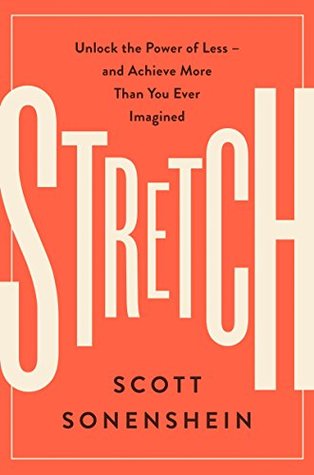More on this book
Kindle Notes & Highlights
Read between
May 27 - June 11, 2017
The problem is: We routinely overestimate the importance of acquiring resources but even more significantly underestimate our ability to make more out of those we have.
the features of an electronic one. Success blinds us and reinforces what made us successful in the first place. We stick to what we know and do well, echoing the cliché, “If it ain’t broke, don’t fix it.” Indeed, a host of research in economics and psychology regularly shows that people naturally prefer the status quo. Maintaining the current state of affairs—coasting through a job, putting a team on autopilot, or exploiting a successful market—can work in the short term.
As uncertainty about our businesses, job, lives, and the world increases, the case for stretching becomes only stronger. I’ll show you how stretching equips us with the abilities to adapt and change when facing a less predictable set of circumstances.
The teacher, steeped in the conventions of physics, misses the many different ways that barometers can help solve the challenge. In much the same way, chasers tend to treat barometers, or any resource for that matter, at face value. Psychologists call the rigidity demonstrated by the physics teacher functional fixedness—an inability to use a resource beyond the traditional approach. It turns out that as we grow older, we become even more tied to social conventions, making it that much more difficult to envision what we have beyond their common uses.
As we grow older and gain more experience with using resources in familiar ways, it becomes more difficult to break free from functional fixedness.
Why might fewer resources lead people to view them more expansively? Diving in deeper, the researchers uncovered a key explanation for their results. With abundance, people treat resources as what they appear on the surface, utilizing them in traditional ways. But when people face scarcity, they give themselves freedom to use resources in less conventional ways.
Stretching means constantly realizing potential in resources that other people readily discard, even when looking in the Dumpster.
Dawson’s transformation of waste into wonders goes beyond food. As she started her company, she looked to women struggling to find work because of homelessness and drug addiction, turning these vagrants into diligent and dedicated employees. She employed a man with brain damage to help label jars of food, and says it is unfortunate that “we judge a person by their looks, in the same way we reject a wonky carrot.”
Experts were no better than the average person in forecasting future events. The professional background and status of experts barely made a difference. Whether experts were liberals or conservative leaning didn’t tip the scales. Optimists and pessimists didn’t differ in their accuracy. It turned out there was only one major difference that separated the high performers from everyone else. People who knew lots of little things and drew from multiple perspectives routinely outperformed those who knew one big thing really well. It was the well rounded who excelled.
The further the problem was from a person’s expertise, the more likely he or she was to solve it.
Experts come with a significant liability—they become what my Rice colleague Erik Dane calls cognitively entrenched, blinded to using resources in ways that depart from conventions.
Diversity in our team’s resources turns out to be the most important shaper of performance, making it more likely we’ll openly debate and reach a better solution that incorporates multiple perspectives.
the multi-c rule: a diversity of experiences allows people to think more expansively about their resources, leading to more divergent ways of approaching problems.


